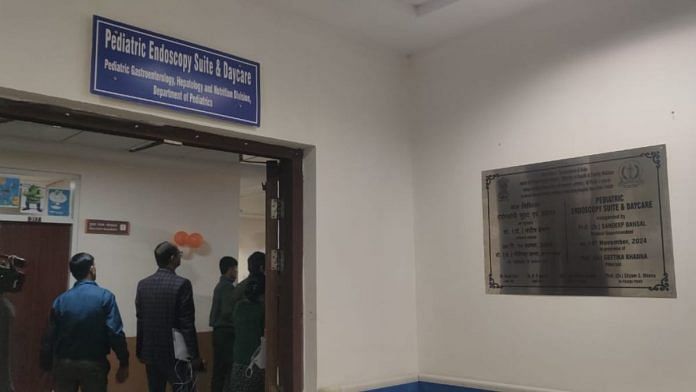New Delhi: Due to an increase in the number of young children requiring endoscopy turning up at New Delhi’s Safdarjung Hospital, its paediatrics department has introduced a first-of-its-kind paediatric endoscopy suite. It will offer diagnostic and therapeutic endoscopy services catered to children, including premature babies weighing two kilograms or less.
Endoscopy is a medical procedure that enables doctors to examine the inside of the body without the need for invasive surgery, and involves the use of a long, flexible tube called an endoscope, equipped with a lens and a video camera at one end.
The endoscope is inserted through a natural opening, such as the mouth, anus or urethra. Light travels through the tube to illuminate the area, while the video camera transmits the image to a monitor for the doctor to view.
Making an announcement of the endoscopy suite at a press conference in New Delhi Thursday, Dr Sandeep Bansal, medical superintendent of Vardhman Mahavir Medical College (VMMC) and Safdarjung Hospital said that the specialised facility also features a 10-bed daycare centre. “This is a very special facility in itself.”
Since its inception on 14 November, the facility has been performing 12 to 14 endoscopies weekly, with five to 10 percent of the cases involving infants weighing less than 3 kilograms.
Dr Ratan Gupta, head of the paediatrics department, said that previously, the department lacked modern equipment to treat children under 10 kilograms, and instead relied on outdated tools with limited imaging quality.
However, with advanced equipment provided by the government, the paediatric gastroenterology unit can now handle a wide range of liver-related issues and safely resolve cases where children ingest non-edible items like pins, coins or batteries, Dr Gupta explained.
“With our daycare facility, most problems are resolved within 2–3 hours,” he added.
He also highlighted how, in the past, the department handled 70 to 80 endoscopy cases, mostly referrals, all managed within the medicine department. With limited resources, endoscopies were conducted during a two-day slot, often leading to long wait times for patients.
However, the introduction of a dedicated paediatric endoscopy machine provided by the Indian government has transformed the process. “Now, we can perform emergency and routine procedures at any time, even during the night, without time constraints,” Dr Gupta said.
Dr Shyam S. Meena, in charge of paediatric gastroendoscopy, explained that 60 percent of endoscopies performed are diagnostic. These help identify diseases or conditions.
The remaining are therapeutic, addressing issues such as foreign body removal. “For instance, if a needle is detected inside a patient, we diagnose and remove it in the same procedure,” he said.
Dr Meena said children often require endoscopy for conditions such as foreign body ingestion, where objects like coins or pins need to be located and removed. Another common issue is portal hypertension caused by liver problems and which leads to swollen veins and blood vomiting. Allergies to substances like milk or ghee can also damage veins and result in blood loss, requiring endoscopy.
Additionally, conditions like polyps, which involve abnormal tissue growth, are frequently addressed through colonoscopy. “Previously, we could only manage these cases on two designated days, but with the new facility, we can now perform these procedures daily,” he said.
The facility is managed by a dedicated team of eight to 10 staff members, including a sister-in-charge and two additional nurses who handle service delivery. The team also includes two highly trained endoscopy technicians who assist with procedures and ensure smooth operations. A nursing orderly supports the day-to-day activities, both inside and outside the suite. Additionally, three doctors are part of the core team, overseeing and performing the procedures.
Dr Sandeep Bansal shared that the Ministry of Health and Family Welfare (MoHFW) has also recently approved the launch of a two-year Fellowship of National Board (FNB) course in paediatric gastroenterology at VMMC and Safdarjung Hospital.
(Edited by Radifah Kabir)
Also Read: Rising AQI & cases of lung ailments renew demand to reinstate respiratory medicine in MBBS courses






